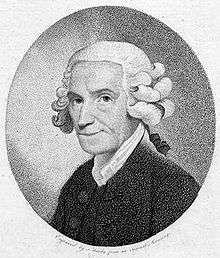James Nares
| James Nares | |
|---|---|
 James Nares by Thomas Hardy | |
| Background information | |
| Born |
19 April 1715 Stanwell |
| Origin | Norwich |
| Died | 10 February 1783 (aged 67) |
| Genres | Classical |
| Occupation(s) | Composer, musician |
| Instruments | Organ, harpsichord |
James Nares (19 April 1715 – 10 February 1783) was an English composer of mostly sacred vocal works, though he also composed for the harpsichord and organ.
Life
Nares was born in Stanwell, although soon after his family moved to Oxfordshire.[1] His brother was a justice, Sir George Nares.
He began his career as Deputy Organist of St. George's Chapel in Windsor Castle, and was later appointed Organist of York Minster in 1735. He married soon after that.[1] Nares was a pupil of Bernard Gates (Master of the King's Choristers), Johann Christoph Pepusch and William Croft. His patron and friend was John Fountayne, the Dean of York.[1]
He replaced his tutor, Gates, as chorister at the Chapel Royal in 1756.[1] At this time the University of Cambridge bestowed the degree Doctor of Music upon him.[1]
He was assistant organist at St George's Chapel in Windsor, then succeeded Salisbury at York Minster,[2] before returning to the Chapel Royal in 1756 to become organist and composer to George III, succeeding Maurice Greene.[1] It is believed that Nares was the first person to systematically publish a series of keyboard lessons for students of the piano.
Nares resigned his duties in July 1781 due to declining health,[1] and died 10 February 1783.[3]
Nares is buried in St. Margaret's, Westminster. His service in F and many of his anthems are still used in cathedrals.[2]
He was the father of Revd Robert Nares (1753–1829), the philologist and author.
Compositions
- The Souls of the Righteous, 1734
- Set of eight Harpsichord Lessons, 1747
- Five Harpsichord lessons, Op. 2, 1759
- Elegy on Mr. Handel, 1759
- Il Principio or a Regular Introduction to playing on the Harpsichord or Organ, 1760
- Six Fugues for Organ, 1772
- Three Easy Harpsichord Lessons, 1778
- A Treatise on Singing, 1778
- The Royal Pastoral, 1778
- Collection of Catches, Canons and Glees, 1778
- Six Organ Fugues, 1778
- Second Treatise on Singing, with a set of English duets, 1778
- Twenty Anthems, 1778
- A Morning and Evening Service and Six Anthems, 1788
Sources
- James Nares. Il Principio or a Regular Introduction to playing on the Harpsichord or Organ, a Facsimile of the Original Edition of 1760 with Introduction Notes by Robin Langley, London, Oxford University Press, 1981.
References
External links
- James Nares at the Nares genealogy project
- Free scores by James Nares in the Choral Public Domain Library (ChoralWiki)
- Free scores by James Nares at the International Music Score Library Project
- Hymn tunes composed by James Nares at Hymnary.org
 Hadden, James Cuthbert (1894). "Nares, James". In Lee, Sidney. Dictionary of National Biography 40. London: Smith, Elder & Co. pp. 92–93.
Hadden, James Cuthbert (1894). "Nares, James". In Lee, Sidney. Dictionary of National Biography 40. London: Smith, Elder & Co. pp. 92–93.
| Cultural offices | ||
|---|---|---|
| Preceded by Maurice Green |
First Organist of the Chapel Royal 1756–1783 |
Succeeded by Samuel Arnold |
| Preceded by Bernard Gates |
Master of the Children of the Chapel Royal 1757–1780 |
Succeeded by Edmund Ayrton |
|